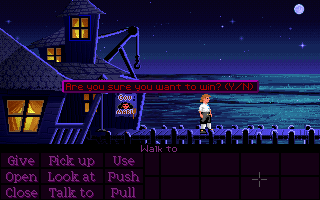Video Game Cheats

Cheats are a big traditions of gaming, whether it's to get through that Nintendo Hard part (or game), skip particularly bad sections of an otherwise great game, to screw around after you've finished a game... Or to ruin other people's fun. There are three main types of cheating in games (although the last is more about the act than the method).
- Internal Cheating: The 'cheat' was specifically programmed into the game by its designers. There are several variants—it can be provided as a menu option, it could be unlockable by in-game achievements (or by inputting a code into a "Password" prompt), or by performing certain obscure combination of buttons or moves from the menu or within the game itself. Sometimes these cheats can do things not directly related to helping you finish a game (or even outright hinder you), such as "big head" codes, wacky colour palettes, or even making a game much harder. Many of these codes were designed to assist game testers in getting through the game without too much effort, and were then left in for players to discover.
- External Cheating: Cheating using devices external to the game itself, such as "Turbo" controllers or ROM hacking devices (e.g. Game Genie or Game Shark). Easily the most varied form of cheating, as the most extreme types actually alter the behavior of the game code itself, not only allowing things like invincibility, but also allowing for things like turning already bizarre bugs Up to Eleven, accessing dummied content, or giving the main character change of costume... Or lose some of it.
- Multiplayer Cheating: Cheating while playing games with other people, goes into both of the above types, as it involves both internal (design oversights and tweaking settings to do such things as see through walls) and external (programs to alter the game to give an advantage). The most (in)famous are Wallhacks (ability to see or move through walls), Aimbots (automatically get a perfect aim at an opponent's most vulnerable areas) and Speedhacks (move MUCH faster than is normally allowed), and, of course, in games where players are in physical proximity there are people who will steal joypads, subtly alter game settings, look at other's screens or outright get physical. It goes without saying that if you do these things with even a hint of seriousness, you deserve everything you get in return.
As a more grey part of internal forms of this, there is also glitch exploitation. Sometimes this can change a game a lot but still make it playable for veterans, which makes it a form of "Stop Having Fun!" Guys if it is mercilessly used on casual players, or it's an outright Game Breaker, where it earns the same effect as cheating against opponents who don't use it themselves.
Players, predictably, have different feelings about cheating. Some think that cheating in any form is inexcusable. They feel that games were meant to be played as is, and cheaters are no-good scum who don't even deserve to look at a joypad. On the other side, players who do cheat feel that a game is meant to be enjoyed, not something to be frustrated about. They believe spending 3,945 hours constantly dying is just a waste of time, and those who do put in the time are losers who have no life. More people than you might think fall squarely into these two extremes. (The third category, however, is much less polarizing, for one reason: cheaters directly affect the enjoyability of the game for others. Thus, they're almost universally reviled.)
Of course, sometimes the computer does this to you.
This is just a page about the types; no examples. Not to be confused with cheating in fights or cheating in relationships.